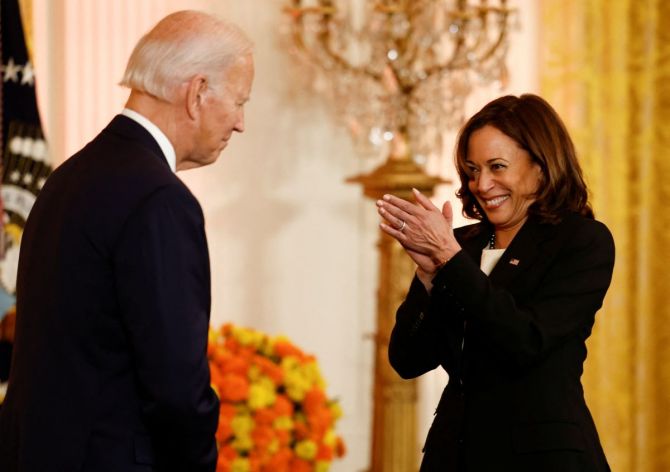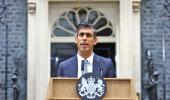If an Indian son-in-law can become prime minister in another country, could the daughter-in-law have not become one here, especially considering that Indian culture and tradition is for the bahu to live, think and act like her in-laws, asks N Sathiya Moorthy.

Even as Indians across the country are celebrating the elevation of 'one of us' in Rishi Sunak becoming prime minister of the erstwhile British colonial rulers, and social media posts recall the Indian/Tamil origins of US Vice-President Kamala Harris, as well, is it still valid to consider Sonia Gandhi a 'foreigner' as the ruling BJP and its Sangh Parivar allies had done when she was the prime ministerial face of the Congress rival in the parliamentary polls of 1998, 1999 and more so in 2004?
The fact is that even before Ravi Sunak and Kamala Harris, such other people of Indian origin had been occupying elected seats of power in many countries, like Fiji, Mauritius and wherever the British colonial masters had taken their ancestors centuries ago.
But unlike most of them, including Sunak and more like Kamala Harris, Sonia is a first-generation 'foreigner', who was riled precisely for that and nothing more at the time.
Ironically, the urban middle class that took the 'foreigner issue' seriously in Sonia's case is also the one that is celebrating the Indian background of Sunak and Harris, among others.
Given her age and health, Sonia may not be in the prime ministerial fray again, but Indians have to address this question to their own satisfaction if their aggressive attitude is not to hamper the future chances of other Indian-origin politicians in these and other nations.
Between them, Sunak is a third-generation Indian, his grandparents having migrated to Africa, and parents, from there to the UK, his nationality.
Like Kamala Harris is US-born, there are also US corporate honchos who are second or third-generation Americans.
In the case of Rishi Sunak, there is a late realisation in Pakistan that he is one of them, that his grandparents came from Gujranwala, in that country post-Partition.
But he practices Hinduism, and there is a possible reluctance for Pakistan's Muslim majority and also the government to acknowledge that the British prime minister was one of them.
It is this dichotomy that some in India have exploited to present Sunak as an Indian, for many Indians, nearer home and overseas to believe.
But even Pakistanis hailing Sunak's ancestry as theirs cannot deny India the claim that he is still a 'son-in-law' of the country, or damaad in Hindi, just as Sonia is a 'daughter-in-law', or bahu.
If the Indian son-in-law can become prime minister in another country, could the daughter-in-law have not become one here, especially considering that the Indian culture and tradition is for the bahu to live, think and act like her in-laws?
Thankfully, with no other 'foreigner' in sight to be staking his or her claims to any elected position in India, the debate may remain academic at best, but inconclusive all the same.
It can still erupt if any 'foreigner aspirant' for the prime minister or any other elected position, appears on the scene, in the future, sooner or later.

Again, the question arises: What do all those Indians hailing Sunak now and Harris earlier expect them to do while representing their nations on issues of bilateral interest and concern?
If the views of the two nations coincide, as may happen in the case of their approaches to China, they may walk that extra step or two.
If national views are divergent, as on Russia or Iran, they would -- and would have to be -- doubly cautious while dealing with India.
First, they represent the nation and the people who elected them.
Secondly, they cannot alter the script that is decided at multiple-levels of policy-making in their political leaderships and State apparatuses, more of the latter than the former.
The tenant of 10 Downing Street or the White House has a lot of power to add some drama and minor cosmetic changes, if it would help him or her with his or her domestic constituencies.
They also have power to lay down their policy at inception -- as long as it fits into the long-standing national approach, not possibly otherwise.
Kamala Harris, if she became US president, could not be seen walking into ministerial-level meetings between India and the US in the White House as George Bush Jr did in his time.
Even as vice-president, she cannot always be seen as receiving an Indian leader on a Sunday or a national holiday as Dick Cheney did. She can do both in the case of other nations, other governments, not possibly India.
The political Opposition in the US is ever ready to tear the incumbent president or vice president to pieces, to make their political point, and would not leave her alone.
They would point to her Indian-ness, and the alleged unwillingness to become American even after America and Americans had given her so much.
It is no different in the case of Rishi Sunak or any other Indian-origin head of State or government elsewhere.
The more Indian-origin leaders you have at the helm in different countries, more problems of the kind they too would have to be cautious about while dealing with India and Indians.

Leave aside geo-strategic and economic policies, on a simpler yet touchy issue such as religion-centred human rights, can Sunak make the establishment in the UK to change its traditional line vis-a-vis India, considering that he is a devout Hindu and is also seen as being one -- his lighting the diyas and offering pranams to Hindu sadhus back home sending out a political message, which he might have otherwise wanted to keep personal?
If one considers lynchings-like violations in India, to which different arms of the US administration and also the UNHRC chief have taken exception, Kamala Harris has possibly not been able to, or unwilling to argue the Government of India's case.
It is invariably left to the official spokesman of India's ministry of external affairs to react to the strong stratements from the US and the UN agencies, but not stall them.
Sunak as British PM is not going to do anything different -- and rightly so, from his government's perspective, whatever be the official Indian position.
If on such a day you ask those that celebrate Sunak as 'India's British PM', they may then withdraw or erase their current social media posts and worse.
If anything, gone may be the days when businessman/parliamentarian Sunak quietly flew into Bengaluru, to visit his equally unassuming in-laws, Infosys's N R Narayana Murthy and wife Sudha Murty, or took out his children to a local restaurant, as social media posts from the past have shown.
Not certainly when he is PM unless it also forms a part of an official visit, where a li'l bit of socialising with the in-laws and their friends and relatives would appeal to Sunak's poll propaganda team back home.
It is nearly two years since Kamala Harris became the US vice president, but she has not found the time to visit her 'motherland', India.
That is because she has not been able to find an official occasion, where she may be able to fit in a personal programme, say, like visiting her ancestral village or family home in southern Tamil Nadu.
Maybe, in her case, her government advisors might have also found it prudent for her to stay away, if only to avoid inconvenient questions from journalists, especially American journalists accompanying her on an otherwise memorable journey back home!
N Sathiya Moorthy, veteran journalist and author, is a Chennai-based policy analyst and commentator.
Feature Presentation: Aslam Hunani/Rediff.com











 © 2025
© 2025